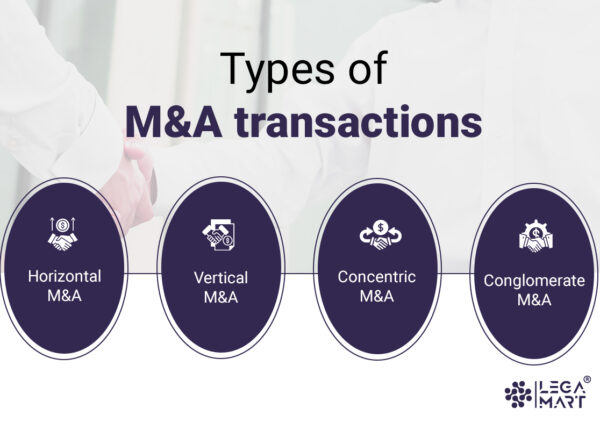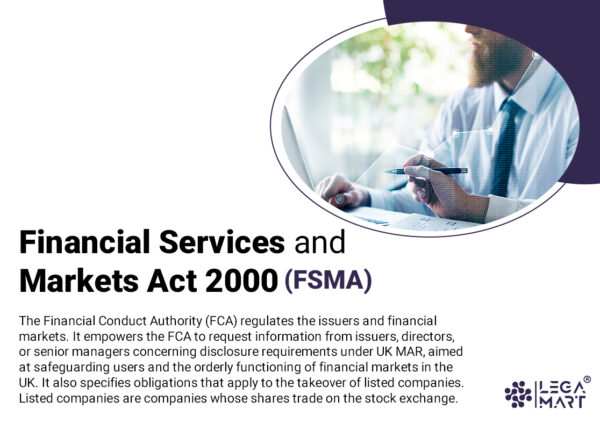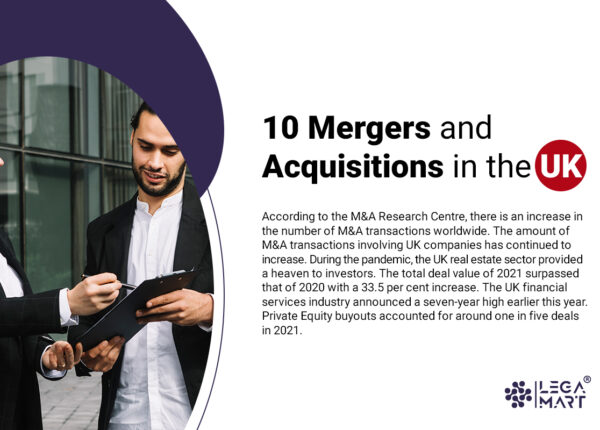- Introduction
- Importance of Mergers and Acquisitions
- Regulation of Mergers and Acquisitions in the United Kingdom
- 10 Upcoming Mergers and Acquisitions in the UK
- Conclusion
Upcoming mergers and acquisitions 2022 in the UK
The number of monthly domestic and cross-border mergers and acquisitions (M&A) deals where a majority share ownership change happened did not change much from April (131) to May 2022 (130). But it took a significant dip in June 2022, with only 72 deals getting completed. In the second quarter of 2022, there were a total of 333 completed M&A transactions in the UK, which was quite a drop compared to the previous quarter (January to March), where there were 449 deals on mergers and acquistions 2022 in UK. 1st quarter, and even fewer compared to the same time in 2021, with 500 deals.
During the second quarter of 2022, when UK companies bought other companies abroad, the total value of those deals was £4.5 billion. This is a big jump from the first quarter of 2022, when it was only £2.8 billion. On the flip side, when foreign companies bought UK companies during the same period, the total value was £16.1 billion, while when UK companies bought other UK companies abroad in the second quarter of 2022, it was worth £2.9 billion, which is a drop from the previous quarter, that was £3.8 billion.
Introduction
The term “mergers and acquisitions” is commonly used in corporate circles. A merger combines two separate entities into a single entity to increase strengths. An acquisition is when a company buys most or all of another company’s shares. M&A is when a company purchases more than 50% of another company’s shares; such a company can make decisions about the newly acquired shares without the approval of the other shareholders. For example, a company in the Middle East buys 55% of a company based in the United States or Hong Kong.
In 2022, the UK witnessed a dynamic landscape in the realm of mergers and acquisitions (M&A) as a series of significant changes in ownership structures, investment patterns, and economic dynamics marked it. From shifts in the volume and value of M&A deals to the emergence of new trends and challenges, the M&A landscape in the UK in 2022 has been a subject of both interest and scrutiny.
Importance of mergers and acquisitions
Each of these mergers and acquisitions costs billions. Companies merge because they want to enjoy competitive advantages. It is why Morgan Stanley closed its acquisition of Eaton Vance in March 2021. Another reason for mergers and acquisitions is to diversify business operations and enter new markets. International acquisitions involve overseas buyers who buy a company to reach new customers. They do this to improve their capacity to market products in international markets. Also, an acquisition helps to increase the market value of the dealmaker’s shares. Companies need to protect the interests of every shareholder.
In an acquisition, a firm approaches its target firm and offers to buy its shares at a specific price. The target company is at the discretion of accepting or rejecting what the firm offers. If the target company agrees with the offer, the acquirer takes control of the company. This article will focus on the upcoming mergers and acquisitions 2022 in the UK.
Types of M&A transactions

(1). Horizontal M&A: This involves one or more organizations taking over or merging with another that operates in the same industry and offers the same products or services. The companies involved are usually in the same stage of production.
(2). Vertical M&A: A vertical merger involves two companies in the same industry but at different stages of the production process. For instance, an automobile company merges with a parts supplier.
(3). Concentric M&A: This involves companies operating in the same industry with similar customer bases but offering different products and services. For instance, a cell phone company is merging with or acquiring a case company.
(4). Conglomerate M&A: This involves companies that have unrelated business activities. These kinds of M&A transactions are entered into to expand industries. For instance, a clothing company acquiring or merging with a software company.
The above types of mergers and acquisitions may be domestic (a UK-based phone company acquiring another UK business) or international (outward M&A transactions and inward M&A transactions). An outward M&A transaction may occur when a UK-based software company gains control or merges with a textile production firm in another country.
It may also occur when a UK-based SMS firm gains control of a software company based in North America or South Africa. At the same time, an inward M&A transaction may occur when an overseas beverage company acquires a UK company. It may also occur when a Hong Kong or New York-based automobile company acquires a UK business. A distressed deal has limited contractual protection for buyers.
Regulation of mergers and acquisitions 2022 in the UK
The UK laws and regulations that govern mergers and acquisitions include:
The City Code on Takeovers and Mergers (the takeover code)
In the UK, when it comes to takeovers of public companies that are traded on regulated markets or multilateral trading facilities or public companies considered residents in the UK, the guiding set of rules is the City Code on Takeovers and Mergers, commonly known as the “Takeover Code.”
The Takeover Code has a comprehensive set of principles and detailed rules which cover the entire takeover process, from the schedule of events to the information that must be shared with the target company’s shareholders and other interested parties. It also dictates how offerors (the companies making the takeover bid) and targets (the companies being acquired) should behave, both during the takeover offer period and after a successful acquisition.
One of the core principles of the Takeover Code is ensuring that all shareholders of the target company, especially those holding the same type of shares, are treated fairly and equally. This includes the information they receive about the takeover and the price offered for their shares. The Takeover Code places strict limits on what offerors can do and explicitly prevents them from making special deals with specific shareholders.
The administration and enforcement of the Takeover Code are handled by the Panel on Takeovers and Mergers, known as the Takeover Panel. Representatives from the Takeover Panel, known as the Panel Executive, actively participate in the takeover process. Each new takeover transaction is assigned a case officer from the Panel Executive who maintains regular communication with the parties and their advisers throughout the entire takeover process.
The key aspect of the UK’s takeover rules is the “put up or shut up” rule, which mandates that when an offeror’s intentions to acquire a company become public, they must, within 28 days, either make a formal offer for the target or publicly declare that they have no intention to make an offer. If they choose not to make an offer, they are typically barred from making one for the same target for six months. Notably, break fees, which the target pays the offeror in case the deal falls through, are generally prohibited to encourage competition.
Additionally, the Takeover Code states that if any shareholder acquires 30% or more of a company’s voting rights under the Code’s jurisdiction or increases their holding from 30% to 50%, they must make a mandatory offer to purchase at least 50% of the target’s shares. This mandatory offer must be made in cash or include a cash alternative, priced at the highest rate paid by the shareholder or any concert party for shares of the same class during the year before announcing the offer. However, the mandatory offer rule can be waived through a shareholder vote, with the approval of the Takeover Panel, in a process known as the whitewash procedure.
UK Companies Act
The Companies Act 2006 (CA 2006) plays a central role in regulating mergers and acquisitions (M&A) in the UK. It provides a statutory foundation for the UK Takeover Code and the regulatory activities of the Takeover Panel. It encompasses procedures for compulsory acquisitions of minority shareholders, the right of minorities to be bought out, rules on investigating share ownership, prohibitions on unlawful financial assistance, provisions for schemes of arrangement, and a seldom-used statutory procedure for merging or dividing UK public companies.
It further outlines various conditions and obligations that must be adhered to in M&A transactions. These requirements encompass:
- Fair Offer: The acquiring company is obligated to extend a fair offer to the shareholders of the target company. This entails that the offer must be equivalent to the market value of the target company’s shares.
- Shareholder Approval: In most instances, M&A transactions necessitate approval from both the shareholders of the acquiring company and those of the target company.
- Competition Law: M&A deals can fall under the purview of competition law regulations. If a transaction is anticipated to diminish competition within a specific market, it may require regulatory approval.
Financial Services and Markets Act 2000 (FSMA)

The Financial Conduct Authority (FCA) regulates the issuers and financial markets. It empowers the FCA to request information from issuers, directors, or senior managers concerning disclosure requirements under UK MAR, aimed at safeguarding users and the orderly functioning of financial markets in the UK. It also specifies obligations that apply to the takeover of listed companies. Listed companies are companies whose shares trade on the stock exchange.
National Security and Investment Act 2021 (NSIA)
This law was enacted on 4 January 2022. It grants the government the authority to review transactions from a national security perspective, particularly those meeting specific control threshold tests. It also enables the imposition of conditions or blockage of transactions, raising national security concerns.
UK Market Abuse Regulation (UK MAR)
This Regulation is derived from the EU Market Abuse Regulation (MAR) and was incorporated following the UK’s withdrawal from the European Union (EU). It addresses insider dealing, unlawful disclosure of inside information, and market manipulation and imposes significant disclosure and reporting requirements regarding inside information and related matters.
Listing Rules
The Listing Rules apply to public companies with securities listed on the FCA’s Official List. For companies with premium (rather than standard) listings they mandate shareholder approval for related party transactions and significant acquisitions.
The Enterprise Act 2002 (as amended by the Enterprise and Regulatory Reform Act 2013)
The Enterprise Act serves as the primary merger control legislation in the UK, enforced by the Competition and Markets Authority (CMA).
The Pensions Regulator
The Pensions Regulator possesses extensive authority to intervene in the administration of occupational pension schemes. Furthermore, with the implementation of the Pension Schemes Act 2021, the regulator will assume additional regulatory duties, especially concerning defined benefit schemes. These schemes are expected to prompt specific notifications to the Pensions Regulator in the event of takeovers. Additionally, Pension Scheme Trustees play a pivotal role in ensuring compliance with regulations and safeguarding the interests of pension scheme members.
The FCA’s Prospectus Regulation Rules
These require issuing a prospectus or equivalent document for offers of transferable securities to the public in the UK or when such securities will be admitted to trading on a regulated market in the UK.
The Financial Services Act 2012
This Act establishes an offence relating to misleading statements or impressions concerning certain investments.
The Disclosure Guidance and Transparency Rules (DTRs)
These necessitate disclosures of substantial holdings of voting shares in target companies traded on a regulated market.
The Criminal Justice Act 1993
This law makes it a criminal offence to engage in specific dealings in securities while possessing inside information or to encourage others to deal or pass on inside information.
Tax Law
After the UK’s departure from the EU, tax policies in the country have evolved. In response to the COVID-19 pandemic, the UK government announced several tax rises, impacting various aspects of the tax system.
The annual corporation tax rate, initially planned to decrease to 17%, will instead increase from 19% to 25% starting in April 2023. Additionally, the diverted profits tax rate will rise from 25% to 31%, reintroducing a small profit rate.
The increase in corporation tax rates is expected to lead to a real increase in tax revenues, unlike previous rate reductions that included measures to broaden the tax base.
The capital gains tax (CGT) annual exempt amount will remain at £12,300 per year until April 2026, potentially affecting taxpayers as inflation erodes its value. Income tax personal allowance and higher-rate thresholds will also be frozen.
A new Health and Social Care Levy will be introduced in two stages, with a temporary 1.25 percentage point increase in national insurance contributions (NICs) for employees and employers from April 2022. This increase will be reversed in April 2023, when the new levy takes effect, impacting employment income twice. The income tax rate on dividends will also increase by 1.25 percentage points from April 2022.
Competition Law
UK Merger Control Regime
In April 2022, the UK government unveiled a series of significant changes aimed at overhauling the country’s competition and consumer law regulations. These changes are mainly focused on the UK’s merger control framework and include the following key adjustments:
- Elevating the UK Turnover Threshold: The UK government proposes to raise the threshold for turnover from £70 million to £100 million, affecting the size of companies subject to merger scrutiny.
- Streamlined Merger Investigations: The reforms aim to enhance the efficiency of merger investigations conducted by the Competition and Markets Authority (CMA). This includes refining and simplifying the ‘fast track’ procedure for certain mergers and allowing the CMA to consider commitments earlier during Phase 2 reviews.
- Enhanced Penalties: The proposed changes also introduce stricter fines for companies and individuals who fail to comply with information requests or provide inaccurate or misleading information during investigations.
Furthermore, the UK had previously expressed its intent to establish a broader foreign investment framework, culminating in the enactment of the UK’s National Security and Investment Act 2021 (NSI Act) on 4 January 2022. This legislation introduces mandatory filings for transactions within 17 key sectors, grants the UK government extended powers to review completed transactions over five years, and applies retrospectively to deals concluded between 12 November 2020 and 3 January 2022. The NSI Act supersedes the previous public interest merger regime outlined in the Enterprise Act 2002, particularly in national security considerations cases.
There is also the Competition and Markets Authority (CMA) in the UK, which has the authority to conduct Phase I reviews of mergers and must refer qualifying acquisition transactions for more detailed Phase II investigations if they pose a significant competition concern. While merger notification is voluntary, the CMA can become aware of transactions through various means and may impose interim orders to prevent integration pending review, potentially leading to divestment orders.
The CMA encourages pre-notification discussions to ensure complete submissions and reduce information requests after notification. Phase I typically begins once a transaction is formally notified, with a statutory time limit of 40 working days for a decision. The CMA may extend this period in exceptional cases.
If a Phase II investigation is required, the parties can offer undertakings within five working days of the substantial lessening of competition decision. The CMA then assesses the acceptability of these undertakings within specific timelines, followed by negotiations and third-party consultations.
At Phase II, the CMA must issue its decision within 24 weeks, extendable by up to eight weeks in special cases. Remedies, if needed, must be decided within 12 weeks, extendable by up to six weeks.
10 Mergers and Acquisitions in the UK

According to the M&A Research Centre, there is an increase in the number of M&A transactions worldwide. The amount of M&A transactions involving UK companies has continued to increase. During the pandemic, the UK real estate sector provided a heaven to investors. The total deal value of 2021 surpassed that of 2020 with a 33.5 per cent increase. The UK financial services industry announced a seven-year high earlier this year. Private Equity buyouts accounted for around one in five deals in 2021.
A private equity firm buys and manages certain companies before selling them. Also, sales of UK targets to overseas buyers rose by 31 percent. Despite some challenges, such as supply chain disruption, transactions remained strong in 2021. The reason is that companies are seeking growth, so they adopt M&A as a growth strategy, not minding the deal’s cost.
As a result, there are many completed deals and many more that are still upcoming. Although there has been growth in the UK M&A market, a few deals are on hold for some reasons. Yet, the deal volume for upcoming deals surpasses the number of fallen deals. Below are some upcoming mergers and acquisitions in the UK.
London Stock Exchange Group Plc (LSEG) Acquisition of Quantile Group Limited
In December 2021, the LSEG announced that it had agreed to buy Quantile Group Limited. The CMA started an inquiry to determine if it would raise competition concerns in the United Kingdom. This month, they concluded that the transaction would not raise competition concerns.
Vistry (VTY) takeover of Countryside Properties(CSP)
Countryside put itself up for sale this year after rejecting two takeover approaches. The British home builder did this because of the pressure from shareholders. In September, Vistry Group and Countryside Partnerships agreed to a takeover. The deal value is £1.25 billion. This transaction will generate value for both Vistry and Countryside shareholders.
OpenText’s Acquisition of Micro Focus
The UK business accepted a takeover offer from OpenText in August. The deal includes the company’s debt and is worth £5.1 billion. This acquisition will bring meaningful revenue and operating scale to OpenText. After this transaction, it will be one of the world’s largest software businesses.
Richemont’s Sale of Online Retainer Stake to Farfetch
The company announced in August that it would sell its online retainer stake to Farfetch. The deal value is 2.7 billion Euros. Farfetch will take a 47.5 per cent stake in Richemont’s multi-brand e-commerce player. This deal caused the shares of Farftech to skyrocket. By taking potential control of its largest rivals, Farfetch will establish market dominance. Farfetch intends to buy more of the online luxury fashion company.
Bourne Leisure in Talks to Buy Back Butlin’s for £300 Million
Bourne Leisure is on the cusp of a deal to regain company control. The deal value is £300 million. UK firms continue to capitalize on the demand for UK domestic holidays. Bourne Leisure will transfer most of the funds to its other brands.
Veolia’s sale of Suez UK waste business to Macquarie for €2 billion
In August 2022, Veolia agreed to sell the UK waste business of Suez to Macquarie for 2 billion Euros. This deal is to resolve competition concerns. After the transaction, Veolia will remain a significant player in the waste sector in the UK. It will also be popular in the environmental services region.
OneWeb and Eutelsat Merger
Both companies signed an initial merger deal in June. The deal value is £2.8 billion. The two companies will structure the transaction as an exchange of shares. This deal will combine the companies’ resources.
Euromoney Acquisition
The finance magazine accepted a buyout from two private equity firms in July 2022. The deal is worth £1.7billion. Paris-based Astorg and London-based Epiris approached the company in June with an offer. Its investors will receive £14.61 per share from both firms due to this transaction.
Shaftesbury Plc and Capital & Counties Properties Merger
This merger would create a new company with a combined portfolio value of £5 billion. The real estate giants agreed to a £3.5 billion all-share merger in June 2022.
Go-ahead Acquisition
Go-Ahead Group agreed to a buyout from Kinetic Holding and Global via Inversiones. The deal is worth £647.7 million. After its announcement, the company’s shares rose by 24 percent.
Those interested in learning about mergers and acquisitions in other countries, such as Brazil and UAE, should check out the M&A series, including information about top international mergers and acquisitions.
Conclusion
The number of UK firms with M&A transactions in 2022 almost surpass that of United States firms. There are also lots of completed deals in the UK. The dealmakers understand the various benefits of mergers and acquisitions. Hence, they adopt them as growth strategies. Aside from the companies mentioned above, there are a lot of other upcoming M&As in the UK. These transactions keep rising as the companies need to gain a competitive advantage.
LegaMart is an online legal service forum that helps applicants find competent lawyers. The Legamart team has a lot of qualified professionals. These professionals handle the most complex transactions with ease! Book a consultation with our experts now.




